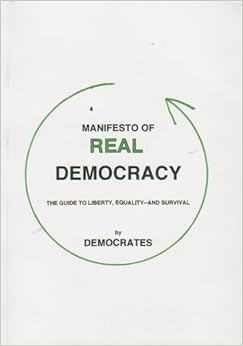Manifesto of Real Democracy: The Guide to Liberty, Equality — and Survival by Democrates http://circleofdemocracy.net/

I have a lot of different thoughts about this book. I picked it up while causally browsing the non-fiction section in an independent bookstore in a small rural Ontario town. It immediately caught my eye. An indie published manifesto on politics? It sounded right up my alley. After finishing it I would definitely say it was an interesting read, but I felt it particularly fell short in laying out a practical, realizable vision for world politics.
The anonymous author argues that the modern global political-economic system gives citizens the illusion of democracy. That current republican/parliamentary representative democracies are facsimiles of true democracy, which was only achieved by the Athenians in ancient Greece. It also argues that transnational corporations and the world’s billionaires have created an economic system that closely resembles medieval feudalism.
This rich minority keeps control by funneling money into political parties, perverting our democracies into nothing better than oligarchies. They argue that this is mostly a consequence of the our republican systems. That representative democracies can never give citizens true control over their political destinies and our bound to be corrupted by the rich to control outcomes.
So the author proposes a new democratic model, what they called a Democracy Circle, modeled after the Athenian democracies. Instead of electing representatives, who often come from wealthy, upper class backgrounds, everyone should be involved in the political process by annually rotating with randomly selected citizens. They also argued this system of personnel rotation should be implemented for the legislature, the judicial branch, as well as for the civil service. The world would then be divided into a cross stitch of states ranging from small rural hamlets, all the way up to cities as large as 60,000 people using these systems.
Now, I think the author raises some good points about money influencing our political process. Our political representatives in most republican and parliamentary democracies are often influenced by corporate donors. The author decries this as a fundamental flaw in representative democracies but in Canada, we’ve actually banned the use of corporate or union donors to federal election campaigns. Of course, there’s still other ways for businesses to help influence politicians, but there’s definitely ways to legislate those sorts of things out of the system. They also raise issue with the fact that most politicians come from a small, upper class minority of the population. I totally agree that this is a systemic problem in representative democracies, and it is an issue that needs to be addressed. (*Warning: Shameless plug incoming since I started working on it*) There are projects like Democracy Kit where they are trying to allow people without political connections or business connections have the resources and knowledge to run for political office. There are people working on these sorts of issues. I think redoing our entire political process in the fashion the authors suggests is unnecessary if we properly concentrate our efforts to solving these problems.
In regards to their proposed political system, I think the author over idealizes how ancient Athenian democracies actually worked and how implementable they would be for modern society. They argue that using this system would get rid of political parties and allow votes to truly represent the will of the people. However, I think this would actually do nothing to remove political parties. These parties exist to gather greater voting power to achieve common goals. I think it is in human nature to want to cooperate and work towards shared objectives. I feel like there is nothing that would make the everyday person less eager to do this than career politicians.
Having the politicians be constantly rotated would also lead to constant changes in policy direction. Nothing would ever be achieved if people are constantly voting yes on things one year, and no on the other years. Programs and policy would constantly be rescinded and renewed, leading to roadblocks in the political process.
I also think having a civil service that is constantly rotating with people would be disastrous. Having no long term staff to see through policy that would take longer than a year to implement would be insane. There would be no long term domain experts and knowledge would constantly be lost.
Finally, I don’t see how it would be possible for the entire world to consist of small city states. There’s a reason there aren’t many of these existing out in our current world (Singapore being a notable exception). Larger governments and states can achieve economies of scale and allow for the distribution of resources from wealthier areas to more troubled ones. How does a small rural hamlet that is supposedly self sufficient expect to raise enough capital to fund infrastructure or build services like hospitals, jails etc. I think this was a serious oversight on the authors part.
These are just some of the flaws I saw in this authors vision for the world. They made some interesting points and comparisons, but overall I felt like they fell flat of laying out a a plan that is in anyway practical. I would rate this book a 4/10. I would recommend this book only to people that truly love reading a wide variety of political material, and don’t mind stuff that isn’t necessarily feasible.